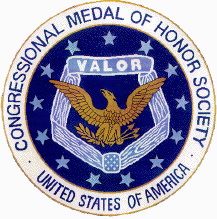|
Para ver este documento
en español, oprima aquí.
Puerto Rico Profile: Hector Santiago-Colon
November 5, 1999
Copyright © 1999 THE PUERTO RICO HERALD. All Rights Reserved.
This article is the final
in a series of four profiles on Puerto Ricans who have been recognized
by the most distinguished award offered to military service personnel
by the United States government.
 Specialist
Fourth Class Hector Santiago-Colon "distinguished himself
at the cost of his life while serving as a gunner in the mortar
platoon of Company B." Santiago-Colon was born in Salinas,
Puerto Rico, and the short life he led has left a permanent positive
imprint on his hometown. Born in the midst of the Second World
War, December 20, 1942, he sacrificed his life on June 28, 1968,
at the age of 25, to save the lives of those who fought beside
him in the Vietnam War. Specialist
Fourth Class Hector Santiago-Colon "distinguished himself
at the cost of his life while serving as a gunner in the mortar
platoon of Company B." Santiago-Colon was born in Salinas,
Puerto Rico, and the short life he led has left a permanent positive
imprint on his hometown. Born in the midst of the Second World
War, December 20, 1942, he sacrificed his life on June 28, 1968,
at the age of 25, to save the lives of those who fought beside
him in the Vietnam War.
Santiago-Colon was the fourth Puerto Rican to be recognized
by the President of the United States with the Congressional Medal
of Honor and the second soldier to have a military installation
on the Island of Puerto Rico named after him in recognition of
his bravery and patriotism.
In July, 1975, the United States National Guard base "Camp
Salinas," near his birthplace, was renamed "Camp Santiago"
in memory of Hector Santiago-Colon, who the National Guard History
book reports, "died in heroic circumstances and who has attained
the highest recognition of valor and patriotism that the United
States can confer on a soldier."
At a time in the late 1960's, when many citizens were protesting
against the war and, among other things, were claiming that minorities
were being sent into battle in disproportionate numbers, Santiago-Colon
volunteered for service in spite of this perceived discrimination.
He enlisted in the army in New York and reported his race on the
application as "Negro."
[In a recently published book , All That We Can Be,
Sociologists Charles C. Moskos and John Sibley Butler, claim to
have analyzed reports that blacks were used like "cannon
fodder" during Vietnam and reported that "this charge
is untrue. Black fatalities," they say, "amounted to
12 percent of all Americans killed in Southeast Asia -- a figure
proportional to the number of blacks in the US population at the
time and slightly lower than the proportion of blacks in the Army
at the close of the war."]
Santiago-Colon's bravery was well documented. He was serving
as a perimeter sentry when he heard distinct movement in the heavily
wooded area. He alerted his fellow sentries in the area to move
to their foxholes and to remain alert for any enemy scouts that
may be in the area. Suddenly, heavy automatic enemy fire sprayed
from the woods around his position and the extreme darkness made
it almost impossible to discern the precise location and identification
of the hostile force.
Santiago-Colon, along with the other members of his position
immediately began to repel the attackers, utilizing hand grenades,
antipersonnel mines and small-arms fire. Because of the heavy
volume of enemy fire and exploding grenades around them, they
were caught off guard when a North Vietnamese soldier crawled
close enough to their position to lob a hand grenade into their
foxhole.
Santiago-Colon realized that there was no time to throw the grenade
out of the foxhole so he grabbed the grenade, "tucked it
in to his stomach and turning away from his comrades, absorbed
the full impact of the blast.
"His heroic self-sacrifice saved the lives of those who
occupied the foxhole with him and provided them with the inspiration
to continue fighting until they had forced the enemy to retreat
from the perimeter."
Hector Santiago-Colon, single, 25-years-old, died in the Quang
Tri province of South Vietnam. He had served only eight months
of his tour of duty, but his unselfish bravery and heroic sacrifice
will not be forgotten.
| 
